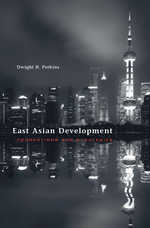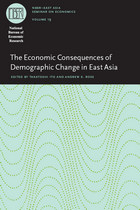18 start with E start with E

In the early 1960s, fewer than five percent of Japanese owned automobiles, China’s per capita income was among the lowest in Asia, and living standards in South Korea’s rural areas were on par with some of the world’s poorest countries. Today, these are three of the most powerful economies on earth. Dwight Perkins grapples with both the contemporary and historical causes and consequences of the turnaround, drawing on firsthand experience in the region to explain how Asian countries sustained such rapid economic growth in the second half of the twentieth century.
East Asian Development offers a comprehensive view of the region, from Japan and the “Asian Tigers” (Hong Kong, Singapore, Taiwan, South Korea) to Indonesia, Vietnam, Thailand, Malaysia, and China—a behemoth larger than all the other economies combined. While the overall picture of Asian growth is positive, no single economic policy has been effective regionwide. Interventionist policies that worked well in some countries failed elsewhere. Perkins analyzes income distribution, to uncover why initially egalitarian societies have ended up in very different places, with Japan, for example, maintaining a modest gap between rich and poor while China has become one of Asia’s most unequal economies.
Today, the once-dynamic Japanese and Korean economies are sluggish, and even China shows signs of losing steam. Perkins investigates whether this is a regional phenomenon or typical of all economies at this stage of development. His inquiry reminds us that the uncharted waters of China’s vast economy make predictions of its future performance speculative at best.

Recent studies show that almost all industrial countries have experienced dramatic decreases in both fertility and mortality rates. This situation has led to aging societies with economies that suffer from both a decline in the working population and a rise in fiscal deficits linked to increased government spending. East Asia exemplifies these trends, and this volume offers an in-depth look at how long-term demographic transitions have taken shape there and how they have affected the economy in the region.
The Economic Consequences of Demographic Change in East Asia assembles a group of experts to explore such topics as comparative demographic change, population aging, the rising cost of health care, and specific policy concerns in individual countries. The volume provides an overview of economic growth in East Asia as well as more specific studies on Japan, Korea, China, and Hong Kong. Offering important insights into the causes and consequences of this transition, this book will benefit students, researchers, and policy makers focused on East Asia as well as anyone concerned with similar trends elsewhere in the world.

Economist Torben M. Andersen shows how the Nordic model rests on two pillars: the social safety net, which offers income compensation to the majority of those unable to support themselves, and the provision of services like education, childcare, and healthcare to all. The Nordic model can be characterized as one of employment, since its financial viability rests on a high labor participation rate with few working poor.
Andersen lays out the structure of the model and highlights factors important for understanding its economic performance. He then looks into specific policy areas based on Denmark's experiences regarding labor market policies (flexicurity), pension systems, and preparation for an aging population; and addresses the challenges arising from new technologies and globalization.

Challenging the arguments for markets, mainstream economics, and capitalism from Adam Smith onwards, Economics After Capitalism provides a step-by-step guide to the writers, movements, and schools of thought critical of neoliberal globalization. These thinkers range from Keynesian-inspired reformists such as George Soros and Joseph Stiglitz and critics of inequality like Thomas Piketty and Amartya Sen to more radical voices such as Naomi Klein, Marxists such as David Harvey, anarchists, and autonomists including Antonio Negri and Michael Hardt.
Wall explains Marx’s economic system in a twenty-first century context and outlines how we can build a democratic economy that, by drawing on the ideas of Elinor Ostrom, Hugo Chavez and others, can renew socialism. In providing a clear and accessible guide to the economics of anti-capitalism, Wall successfully demonstrates that an alternative to rampant climate change, elite rule and financial chaos is not just necessary, but possible.


America’s commitment to public schooling once seemed unshakable. But today the movement to privatize K–12 education is stronger than ever. Samuel E. Abrams examines the rise of market forces in public education and reveals how a commercial mindset has taken over.
“[An] outstanding book.”
—Carol Burris, Washington Post
“Given the near-complete absence of public information and debate about the stealth effort to privatize public schools, this is the right time for the appearance of [this book]. Samuel E. Abrams, a veteran teacher and administrator, has written an elegant analysis of the workings of market forces in education.”
—Diane Ravitch, New York Review of Books
“Education and the Commercial Mindset provides the most detailed and comprehensive analysis of the school privatization movement to date. Students of American education will learn a great deal from it.”
—Leo Casey, Dissent



Surveying many aspects of education—from administrative structures to the availability of health care to parent and student incentives—the contributors synthesize an impressive diversity of data, paying special attention to the gross imbalances in educational achievement that still exist between developed and developing countries. They draw out clear implications for governmental policy at a variety of levels, conscious of economic realities such as budget constraints, and point to crucial areas where future research is needed. Offering a wealth of insights into one of the best investments a nation can make, Education Policy in Developing Countries is an essential contribution to this most urgent field.

China is emerging as a truly global economic and political power. China’s impact on Latin America and the Caribbean region is mixed, however—fostering a trade market for some countries, but creating competition for others.
This pioneering volume, produced by the Inter-American Development Bank’s Integration and Regional Programs Department and Research Department, provides a comprehensive overview of China’s economic policy and performance over recent decades and contrasts them with the Latin American experience. What are the underlying factors behind China’s competitive edge? What are the strategic implications of China’s rise for growth and development in Latin America? These questions open new avenues for thinking about revitalizing development strategies in Latin America in the face of China’s successful development and reduction of poverty. This insightful report is a must-read for analysts, policymakers, and development practitioners, not only in Latin America and the Caribbean, but wherever China’s presence is being felt.
The Emergence of China is a copublication of the David Rockefeller Center for Latin American Studies and the Inter-American Development Bank.

In developing a material history of the study of religion, Chidester documents the importance of African religion, the persistence of the divide between savagery and civilization, and the salience of mediations—imperial, colonial, and indigenous—in which knowledge about religions was produced. He then identifies the recurrence of these mediations in a number of case studies, including Friedrich Max Müller’s dependence on colonial experts, H. Rider Haggard and John Buchan’s fictional accounts of African religion, and W. E. B. Du Bois’s studies of African religion. By reclaiming these theorists for this history, Chidester shows that race, rather than theology, was formative in the emerging study of religion in Europe and North America. Sure to be controversial, Empire of Religion is a major contribution to the field of comparative religious studies.



Uniquely in the United States, lawyers litigate large cases on behalf of many claimants who could not afford to sue individually. In these class actions, attorneys act typically as risk-taking entrepreneurs, effectively hiring the client rather than acting as the client’s agent. Lawyer-financed, lawyer-controlled, and lawyer-settled, such entrepreneurial litigation invites lawyers to sometimes act more in their own interest than in the interest of their clients. And because class litigation aggregates many claims, defendants object that its massive scale amounts to legalized extortion. Yet, without such devices as the class action and contingent fees, many meritorious claims would never be asserted.
John Coffee examines the dilemmas surrounding entrepreneurial litigation in a variety of specific contexts, including derivative actions, securities class actions, merger litigation, and mass tort litigation. His concise history traces how practices developed since the early days of the Republic, exploded at the end of the twentieth century, and then waned as Supreme Court decisions and legislation sharply curtailed the reach of entrepreneurial litigation. In an evenhanded account, Coffee assesses both the strengths and weaknesses of entrepreneurial litigation and proposes a number of reforms to achieve a fairer balance. His goal is to save the class action, not discard it, and to make private enforcement of law more democratically accountable. Taking a global perspective, he also considers the feasibility of exporting a modified form of entrepreneurial litigation to other countries that are today seeking a mechanism for aggregate representation.

The four types of equality have their origins in unique political compromises made in the twentieth century. The resulting social market economies of these countries affect their growth and levels of equality even today.

Taking cues from the Japanese concept of ethical or stakeholder capitalism, this book demonstrates how the business activities of firms in Thailand and Indonesia are guided by their perceptions of morality in society and their concerns about the environment. The authors explore the likelihood that foreign influences contributed to the development of such management philosophies, for example through the expansion of Japanese subsidiary firms in the 1980s or the spread of foreign articulations of the concept of corporate social responsibility (CSR) since the 2000s. Companies in both countries may exercise a degree of pragmatism in how they develop these activities. As the authors reveal, the perceptions of morality in business that have shaped many entrepreneurs and companies in Thailand and Indonesia are their responses to the dynamic political, social, and economic factors that have formed the business environments of both countries.

Despite western Europe's traditional disdain for the United States' "adversarial legalism," the European Union is shifting toward a very similar approach to the law, according to Daniel Kelemen. Coining the term "eurolegalism" to describe the hybrid that is now developing in Europe, he shows how the political and organizational realities of the EU make this shift inevitable.
The model of regulatory law that had long predominated in western Europe was more informal and cooperative than its American counterpart. It relied less on lawyers, courts, and private enforcement, and more on opaque networks of bureaucrats and other interests that developed and implemented regulatory policies in concert. European regulators chose flexible, informal means of achieving their objectives, and counted on the courts to challenge their decisions only rarely. Regulation through litigation-central to the U.S. model-was largely absent in Europe.
But that changed with the advent of the European Union. Kelemen argues that the EU's fragmented institutional structure and the priority it has put on market integration have generated political incentives and functional pressures that have moved EU policymakers to enact detailed, transparent, judicially enforceable rules-often framed as "rights"-and back them with public enforcement litigation as well as enhanced opportunities for private litigation by individuals, interest groups, and firms.

READERS
Browse our collection.
PUBLISHERS
See BiblioVault's publisher services.
STUDENT SERVICES
Files for college accessibility offices.
UChicago Accessibility Resources
home | accessibility | search | about | contact us
BiblioVault ® 2001 - 2024
The University of Chicago Press









